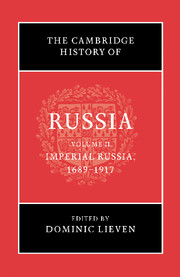Book contents
- Frontmatter
- Introduction
- Part I Empire
- Part II Culture, Ideas, Identities
- Part III Non-Russian Nationalities
- Part IV Russian Society, Law and Economy
- Part V Government
- Part VI Foreign Policy and the Armed Forces
- Part VII Reform, War and Revolution
- 28 The reign of Alexander II: a watershed?
- 29 Russian workers and revolution
- 30 Police and revolutionaries
- 31 War and revolution, 1914–1917
- Bibliography
- Index
- Map 5. The Russian Empire (1913). From Archie Brown, Michael Kaser, and G. S. Smith (eds.) Cambridge Encyclopedia of Russia 1982.">
- Plate Section">
- References
29 - Russian workers and revolution
from Part VII - Reform, War and Revolution
Published online by Cambridge University Press: 28 March 2008
- Frontmatter
- Introduction
- Part I Empire
- Part II Culture, Ideas, Identities
- Part III Non-Russian Nationalities
- Part IV Russian Society, Law and Economy
- Part V Government
- Part VI Foreign Policy and the Armed Forces
- Part VII Reform, War and Revolution
- 28 The reign of Alexander II: a watershed?
- 29 Russian workers and revolution
- 30 Police and revolutionaries
- 31 War and revolution, 1914–1917
- Bibliography
- Index
- Map 5. The Russian Empire (1913). From Archie Brown, Michael Kaser, and G. S. Smith (eds.) Cambridge Encyclopedia of Russia 1982.">
- Plate Section">
- References
Summary
‘Workers’, people who live off their daily labour and the sweat of their brows, have of course been present since the very dawn of Russian history. Depending on the exact time and place, they have included slave labourers (largely extinct by the beginning of the eighteenth century), a wide variety of highly restricted serfs (numerically dominant from the sixteenth century to 1861 if we include peasants whose lord was the state), and free or ‘freely-hired’ (vol’nonaemnye) labourers, but ‘free’ only in the sense that their obligation to their employer, at least theoretically, was purely contractual, while they remained the bondsmen of their noble lords. Viewed more narrowly, however, defined not simply as people who worked for a living, but only as those employed in manufacturing and paid a wage, workers started to become important to the Russian economy and society mainly in the eighteenth century, beginning with the reign of Peter the Great (1689–1725), who placed a high priority on the country’s industrial development. But even under Peter and for many years to come, most workers employed in manufacturing and mining, even if paid in cash or in kind, were unfree labourers, forced to toil long hours either in privately owned enterprises or in factories owned by the government. Among those who experienced the worst conditions in this period of labour-intensive industrialisation were the ‘possessional’ (posessionnye) and ‘ascribed’ (pripisannye) workers – state peasants who, since Peter’s time, had been bound to the factory or its owner, and who were compelled to pass this unfortunate status on down to their children.
Keywords
- Type
- Chapter
- Information
- The Cambridge History of Russia , pp. 617 - 636Publisher: Cambridge University PressPrint publication year: 2006
References
- 2
- Cited by

